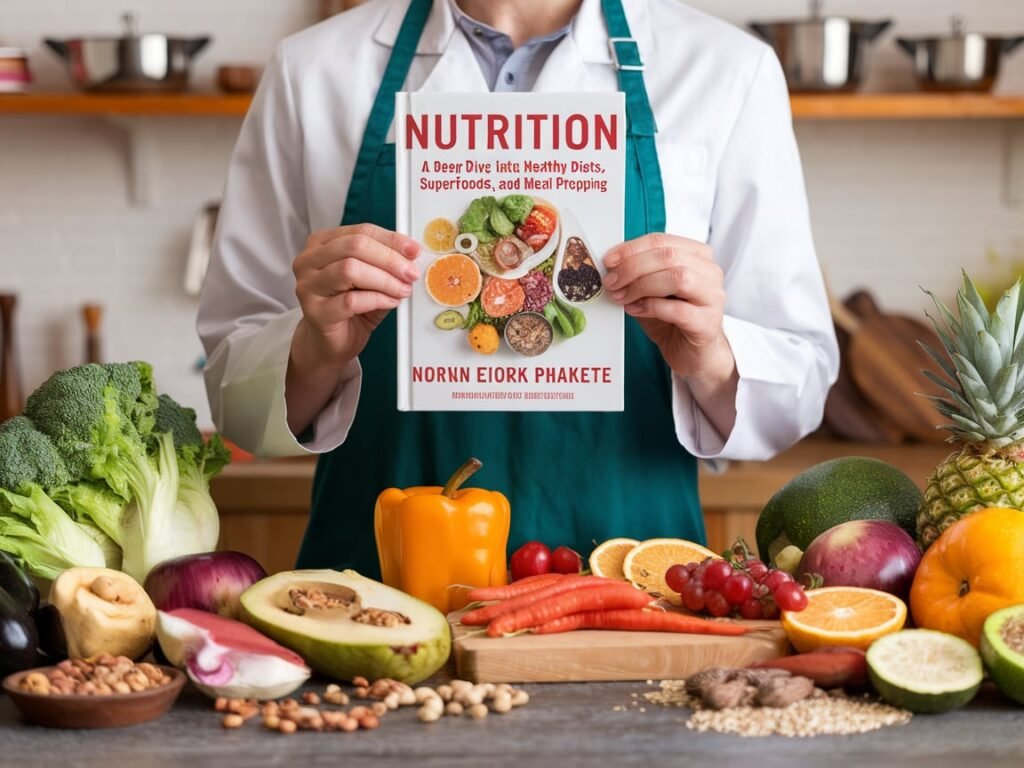In our fast-paced world, nutrition plays a pivotal role in maintaining health and well-being. Understanding various dietary approaches, incorporating superfoods, and mastering meal prepping can empower individuals to make informed food choices. This article explores popular diets like keto and plant-based, highlights nutrient-dense superfoods, and provides practical tips for effective meal prepping.
Understanding Healthy Diets
1. The Keto Diet
The ketogenic (keto) diet is a low-carb, high-fat diet designed to shift the body’s metabolism away from carbohydrates and towards fats.
Key Principles:
- Carbohydrate Restriction: Typically limits carbs to 20-50 grams per day.
- High Fat Intake: Emphasizes healthy fats, comprising about 70-75% of total caloric intake.
- Moderate Protein: Encourages moderate protein consumption, around 20-25%.
Benefits:
- Weight Loss: Promotes rapid weight loss by inducing a state of ketosis, where the body burns fat for fuel.
- Improved Blood Sugar Control: May help manage blood sugar levels and reduce insulin resistance.
- Increased Energy Levels: Many report sustained energy and mental clarity.
Considerations:
- Potential nutrient deficiencies if not well-planned.
- May not be suitable for everyone, particularly those with certain medical conditions.
2. Plant-Based Diet
A plant-based diet emphasizes whole, minimally processed foods derived from plants. This approach can vary in strictness, from veganism (excluding all animal products) to vegetarianism (including dairy and eggs).
Key Principles:
- Whole Foods Focus: Prioritizes fruits, vegetables, whole grains, nuts, seeds, and legumes.
- Minimally Processed: Encourages avoiding refined sugars and highly processed foods.
Benefits:
- Nutrient-Rich: High in vitamins, minerals, and antioxidants.
- Reduced Risk of Chronic Diseases: Linked to lower rates of heart disease, diabetes, and certain cancers.
- Weight Management: Often lower in calories and high in fiber, promoting satiety.
Considerations:
- Requires careful planning to ensure adequate protein, vitamin B12, iron, and omega-3 fatty acid intake.
Superfoods: Nutrient Powerhouses
1. Berries
Berries, such as blueberries, strawberries, and raspberries, are rich in antioxidants, vitamins, and fiber. They may help reduce inflammation and support heart health.
2. Leafy Greens
Vegetables like spinach, kale, and Swiss chard are high in vitamins A, C, K, and minerals like calcium and iron. They support bone health and immune function.
3. Quinoa
Quinoa is a complete protein, containing all nine essential amino acids. It’s also gluten-free and high in fiber, making it a fantastic grain alternative.
4. Nuts and Seeds
Almonds, walnuts, chia seeds, and flaxseeds are packed with healthy fats, protein, and fiber. They promote heart health and support brain function.
5. Fatty Fish
Salmon, mackerel, and sardines are high in omega-3 fatty acids, essential for brain health and reducing inflammation. Aim to include fatty fish in your diet at least twice a week.
Meal Prepping: A Key to Success
Meal prepping involves preparing meals in advance to save time, reduce stress, and promote healthier eating habits. Here’s how to get started:
1. Plan Your Meals
Begin by planning your meals for the week. Consider including a variety of proteins, grains, and vegetables to ensure balanced nutrition.
2. Create a Shopping List
Once your meals are planned, create a shopping list to ensure you have all the ingredients on hand. Stick to the list to avoid impulse purchases.
3. Batch Cooking
Set aside a few hours each week to batch cook meals. Prepare large quantities of grains, proteins, and roasted vegetables that can be mixed and matched throughout the week.
4. Use Proper Storage
Invest in high-quality containers to store your prepped meals. Glass containers are a great option for reheating and preserving freshness.
5. Label and Date
Labeling your meals with the date helps you keep track of freshness and avoid food waste.
Sample Meal Prep Plan
Breakfast:
- Overnight oats with chia seeds, almond milk, and mixed berries.
Lunch:
- Quinoa salad with chickpeas, cherry tomatoes, cucumber, and a lemon-tahini dressing.
Dinner:
- Baked salmon with roasted sweet potatoes and steamed broccoli.
Snacks:
- Hummus with carrot sticks and a handful of nuts.
Tips for Successful Meal Prepping
- Start Small: If you’re new to meal prepping, start with one or two meals per week and gradually increase.
- Incorporate Variety: Avoid monotony by varying your meals each week.
- Stay Organized: Keep your fridge and pantry organized to make meal prep easier.
- Make it Enjoyable: Listen to music or podcasts while you prep to make it more enjoyable.
Conclusion
Nutrition is a vital component of overall health, and understanding different diets, superfoods, and meal prepping can significantly enhance your well-being. Whether you choose to follow a keto or plant-based diet, incorporating nutrient-dense foods and effective meal planning will empower you to make healthier choices.
FAQs
1. What is the keto diet?
The keto diet is a low-carb, high-fat diet that shifts the body’s metabolism to burn fat for fuel, promoting weight loss and improved energy levels.
2. Can a plant-based diet provide enough protein?
Yes, a well-planned plant-based diet can provide sufficient protein through legumes, nuts, seeds, tofu, and whole grains.
3. What are superfoods?
Superfoods are nutrient-dense foods that offer exceptional health benefits, such as berries, leafy greens, and fatty fish.
4. How do I start meal prepping?
Begin by planning your meals for the week, creating a shopping list, and batch cooking ingredients to save time and promote healthier eating.
5. Is meal prepping time-consuming?
Initially, it may take some time to set up, but with practice, meal prepping can become a quick and efficient way to ensure healthy meals throughout the week.

